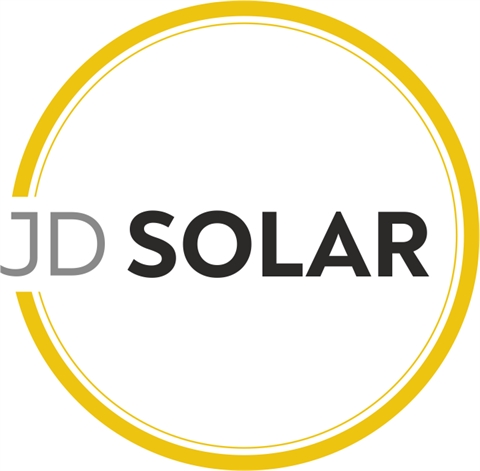Julian Dimov: The own Renewable Energy Systems solve many of the problems of the companies related to the high electricity prices
Mr. Dimov, as a businessman operating in several sectors, how do you see the Green Deal, the EU requirements in this direction and the achievement of the goals?
The Green Deal and the RES sector in general is a topic with many opportunities for many EU countries, including Bulgaria. Along with the restrictions it imposes and, to some extent, rising prices, the Green Deal can be a challenge for both businesses and citizens on how to deal with the reforms it envisages. Also, the Green Deal, the Recovery and Development Plan, and some other instruments can help the process. As a person who works in several sectors, one of which is the supply of specialized vehiclesthroughmy company Avto Engineering Holding Group, I look to the future and see that the processes that take place in conventional vehicles and their replacement with electric is inevitable. The future cannot be stopped. Eventually, the path will be found and it will happen.
And the advantages of the new technologies are many. For example, electric buses do not pollute, are quieter, have lower operating costs. On the other hand, there are challenges for this and other businesses. For the development of electric mobility, for example, charging stations must be built. There must be also energy storage systems for the balance of the electricity system. All this is now fully available in Europe, and through financial instruments it will be available to business. And it has yet to figure out how all this can reduce the cost of the electricity which is needed.
The EU's plans are to produce clean electricity wherever possible, for example through photovoltaics on rooftops, and that is a good thing to do.
Two years ago we created a company whose activity is related to green energy - JD Solar. This is a design company that uses the experience of building roof photovoltaic structures, accumulated for about 10 years in Germany. But here we are talking about larger ones with an area of 10-20-30 thousand square meters. These are large buildings or enterprises with many buildings.
And why did you start developing this business first in Germany and not in Bulgaria?
About 10 years ago, our German partners asked us if we could install rooftop photovoltaic installations. At that time, this market in our country was still in its infancy. We had a licensed construction company in our structure, as well as a legal opportunity to send up to 25% of its staff abroad. We started with a group of 6-7 people. Later, their number increased to about 20people, who are already permanently employed and work in Germany nowadays.
Entrepreneurs there have made a very good model for financing photovoltaic projects. They created the so-called the right to use the roof space of larger buildings, enabling them to build more serious installations of about 1 MW of installed capacity, even more. We started with single projects, but gradually the group started working permanently in Germany. For us, this was a very useful experience, because as people who are always looking for new opportunities, we try to use the Western model, including the German one, and we saw a very good business model.
What is this model?
A German company is recruiting investors who are interested in new technologies, including production and trade in green energy, making a business plan for the return on investment (in Germanyif it pays off in 10 years is a good investment), based on which the financial model is built. There the standard is 10% of the investment to be covered by the companies, the remaining 90% is provided by the banks at an interest rate of about 1%. On the other hand, photovoltaic plants have a life of about 20 years. Even with a 10-year return on investment, there is still so much time for additional business and income opportunity for entrepreneurs who prefer not to keep their money in banks, but to have an alternative form of income and greater security. This is especially true in the current situation.
It impressed us that this area is developing dynamically, a lot of projects are being implemented, there is a lot of work. That is why we started thinking about how to implement this model in Bulgaria. Two years ago we started to take the first steps and we have already implemented several successful projects. To prove our expertise in building solar systems on roof structures and managing the whole process, we made them on our buildings to demonstrate how this works. On the roof structures of our factory for production of pellets, pallets and wood processing - "MOST", which is located in the village of the same name next to Kardzhali, we built an installation with an installed capacity of about 300 kW, which covers about 15-20% of its electricity needs. The pros are many, it's not just your own electricity production. It saves, for example, from the costs for access to the electricity distribution network, which are paid to the energy company and which are in the range of BGN 50-60 per megawatt. By satisfying your own electricity needs, you save this money and thus optimize your production costs. On the other hand, you adjust your production to the electricity you produce yourself, reorganize your work so that you work in these parts of the day, which allows you to make the most of the benefits of your own electricity production. And in this way a faster return on investment is achieved. Not to be overlooked is the possibility, apart from using the produced electricity for your own needs, to sell the surplus to traders.
Many companies are complaining about electricity prices right now. But instead, you need to look for opportunities to optimize your costs.
We also offer this opportunity to other businesses. We have expertise and know-how, so we can make a business model according to their consumption, what kind of installation they need, what will be the investment. And, if they do not have the financial means to participate in this project, a separate company can be created to build this solar installation on their roof, and the owner of the building to receive a percentage of income and thus make money, and at the same time to take advantage of the preferences of their own electricity production. Another option is to share the profits honestly and openly.
What revenues and profits can be expected from the introduction of this model in Bulgaria?
In our country the return is in the range of 7-8 years. This is a virtually risk-free investment. Consumption of electricity from the sectors in which it is a resource will not decrease, on the contrary - will increase over the years. In the current situation with the pandemic and business problems, new opportunities must be actively sought. Unfortunately, the Bulgarian people are a bit conservative thinking about innovation, they always thinks that someone will deceive them, that they will not get any effect. But these are proven models that work in Europe. Anyone who has such an opportunity there is looking to install their own sources of electricity. But there are also other possibilities.
What are they?
Depending on the specifics, the construction of your own RES installation can lead to additional opportunities. For example, if the building is in a communicative place, it already has a photovoltaic installation, a substation, what prevents it from being built and a fast charging station for electric vehicles, which can charge them up to 80% in 15 minutes. This is the time to drinkone coffee. Energy storage systems are another option. Thus, in the days when it is not working, a business will be able to accumulate and store in batteries, let say 25% of the energy produced by its installation and then use it. Or, if it is an enterprise with a continuous production process, to consume stored electricity at night, when photovoltaics do not produce electricity.
All this is on the market, used in many countries. This is forthcoming with us under the Recovery Plan and the Green Deal. But the EU will not give money just like that, but for ready-made projects. And the business, if prepared, will be able to participate on a competitive basis to receive subsidies and implement these projects. But the main goal should not be how to make money, but how to make the company competitive, how new energy sources can reduce its costs and develop and move forward on the basis of innovation. From this point of view, there are many prospects for business.
And are there any obstacles?
Under the Green Deal there are requirements, the achievement of which requires all market players - banks, investment funds, entrepreneurs, etc., to unite in order to implement these projects. Once realized, they remain and will work on the free market. And the more installed capacity there is, the easier it will be to meet electricity needs. Last but not least, coal-fired power plants, which are already closed in many countries, and we will not be able to make an exception. In order to receive funds, we will have to give reforms in return. So these plants will be closed at some point. In these regions, too, businesses will be supported through various programs to transform and prevent unemployment, especially for people who are currently involved in the operation of TPPs.
The EC envisages that not only businesses, but also residential buildings will have their own installations for electricity production. How do you see this opportunity?
At this stage it will be quite difficult in our country. For example, we can take the rehabilitation program. In the beginning there was a requirement for a small percentage of self-participation of the owners and their activity was close to zero. Then, although 100% of the costs were already covered, things started hard because people didn't know yet, didn't believe, and so on. But this was not the right approach. Moreover, no one gives a 100% grant under the new programs and financial instruments. From this point of view, I am a little pessimistic. In our country, almost everyone thinks that the state should renovate his home, make it energy efficient. And no one considers that this reduces their costs and increases the price of their apartment by 15-20 thousand levs.
On the other hand, these projects will be difficult to implement because many people live in one block and some dissident will decide that he does not want to pay, which will ruin the project. Thus, the issue will be difficult to resolve, unless there is a total change in legislation. For example, as in the West - when someone does not want to participate in the repair of common areas, the other owners take a loan, the repair is done and who does not pay their share, at some point may be left without an apartment.
That is why I am more pessimistic about residential buildings and more optimistic about companies. With them, decisions are usually made quickly, even if there are 5 owners. They realize that with a solar installation, their electricity costs will be halved and they will make an immediate decision. But it is important in such cases to use the expertise of companies such as JD Solar. Because in Bulgaria, unfortunately, the process is quite bureaucratic, you have to be aware of it, because you go through municipalities, through the electricity distribution company, through ESO and many institutions. It's complicated, time consuming, so it's good to be done by an experienced company.
How long does a photovoltaic installation project take?
Due to the large bureaucracy and the many procedures, not only the ones listed, it takes an awful lot of time in our country. And in Germany, for example, only 72 hours pass from the moment the installation is built and ready to the connection to the network. In our country the same process can take 3 or 6 months. Therefore, the connections and processes between the EDPs, the ESO, the administration and all units need to be improved in order to shorten the time and documentation of the whole process in order to have a faster effect of the investment. Last but not least, this applies to banks. They need to think more positively towards the green energy sector. Don't just see the problems. At the moment, they have a huge financial resource, and people and companies have to pay the so-called penalty interest. At the same time with these funds can be implemented projects that will generate profits, economic development. That is why it is very important for banks to be much more adequate to these projects.
Is there a bank in Bulgaria that is willing, like the German ones, to take 90% of the investment in such a project?
The common practice in our country is for the investor to take 20% and the bank - the remaining 80. But there are a bunch of other requirements such as guaranteeing financing during the project implementation, then guaranteeing or controlling revenues for a certain period etc. And another trend is already observed in the market. In addition to the increase in the price of electricity, the price of many other components such as solar panels, metal structures and others is increasing. And if the companies working in this sector cannot get quick financing and react within 2 weeks, for them the investment can already become much more expensive.
About 90% of the components for this business come from China. Deliveries take 30 to 45 days. If you can't quickly secure the financing and start ordering and paying, and you have to wait 3 months for the bank to approve the financing, during this time the price of the project will be different. In the last 3 months alone, solar panels have risen by 15-20%.
Does the development of electric mobility require more synergy between business and the state or municipalities?
Currently, the programs finance mainly the electrification of public transport, which is undoubtedly good. But the next mandatory step is for people to have incentives to start driving electric cars. Unfortunately, at the moment they are not big enough to make you "green". First, the price of these cars is about 50% higher. Second - there are no tax breaks. Third, no one is encouraged to build charging stations. As I mentioned, when installing a roof installation, a substation is being built, which allows for the construction of a charging station. But the price of a fast one is BGN 70,000. And no company is encouraged to make such an investment, because there are no grants, no programs through which it knows that its investment will pay off in the foreseeable future.
I am convinced that this will change, because this is the future. But the issue should be resolved within 2-3 years and such projects should be implemented. And there are huge possibilities for a combination of solar installations and charging stations. For example, companies whose buildings are in a communicative place or in an industrial zone where there is traffic, can easily develop such projects.
The automotive industry has always been one of the main drivers of progress. It is currently being electrified. Along with new businesses, electrification offers many new opportunities. So we have to think about how to use them and make everyone benefit from it.
Electric buses began to enter the public transport in our country. Are such solar installations suitable for these fleets?
I already have observations from several cities with which we have the pleasure to work and deliver buses as a representative of the fourth largest factory for such in China - Golden Dragon. The effect for municipal public transport companies is huge. Everywhere the replacement of diesel buses with electric wires and the construction of charging stations. The next step must be a solar installation to generate electricity for these stations, but also the construction of a system for storing the energy produced. Because public transport buses work 18 hours a day and for transport companies such solutions are very useful and effective.
It is with them that the effect will be most visible. Trolleybus and bus depots are perfect for this type of project. But there are also many municipal companies with large fleets or with high electricity consumption, or with a large building stock, for which the roof installations are also very suitable.
Do you see them as a realization soon?
This is a complex process. If it's up to us, it will happen soon. But for such a project to become a reality, it must go through the entire pre-investment and investment process. If conditions are created for it to be reduced, this will give a boost and will lead to an incredible number of benefits for the Bulgarian economy.
What are your recommendations to the state and municipalities in order to give impetus to such projects?
In the first place, business must not be hindered, it must be left to work, to have a competitive environment. And when someone is enterprising, do not get in the way. From a tax environment in Bulgaria we are perfect, but the administration and procedures must be worked on. Everyone in the chain needs to be more efficient and let the business run. Then things will happen much faster, the effect will be greater, and we will achieve the Green Transition faster.
Apart from the buildings of companies from your group, have you already implemented projects with other companies?
At the moment we have started to implement 5 projects with capacity between 2 and 5 MW in industrial zones. But there is definitely interest in rooftop installations. It is much easier and faster to implement such a project with a company that is already connected to the electricity grid and has a substation. Even in the situation in Bulgaria, the whole process will take 3 to 6 months. However, the main obstacles are negativism and pessimism.
I was very enthusiastic 2 years ago when we started this business. And I thought things would happen like in Germany. Unfortunately, at the moment, especially with the huge rise in electricity prices, companies are thinking about how to pay their bills, rather than hiring to make long-term investments to ensure their own production and independence from the market. To avoid this problem, JD Solar has from the beginning offered flexible options for building a roof installation against a 10% share of the building owner in the newly established company. We are implementing a German model that has been proven over time and works.
JD Solar Web Site: https://www.jdsolar.eu/
To the News: Dir.bg

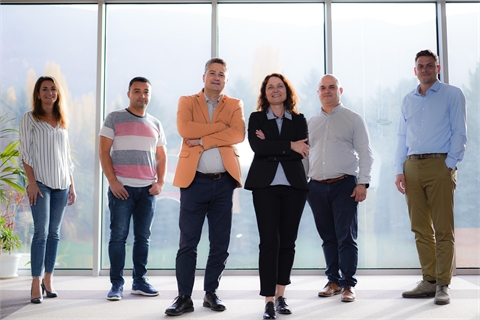
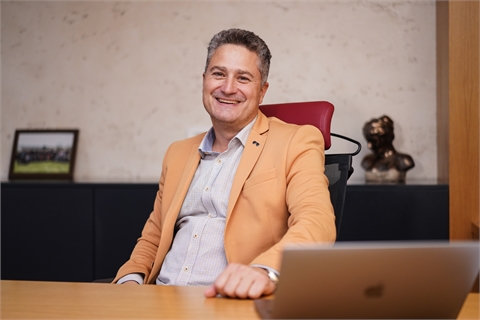
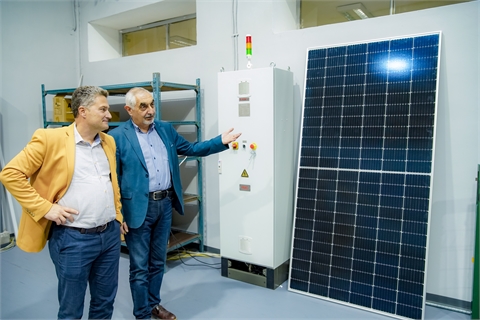
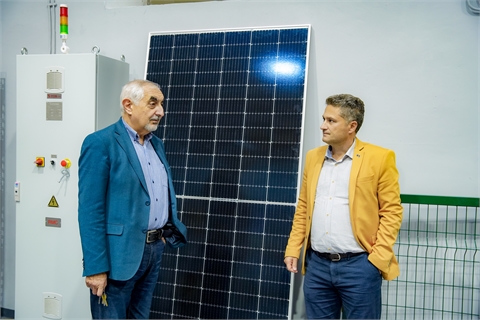
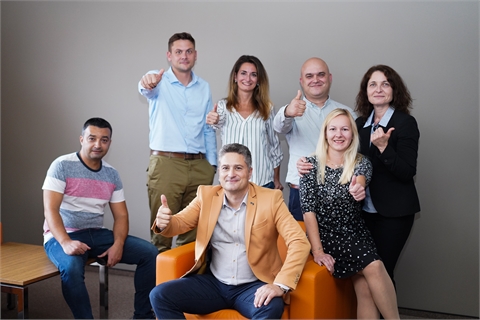
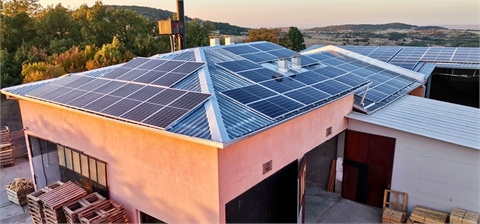
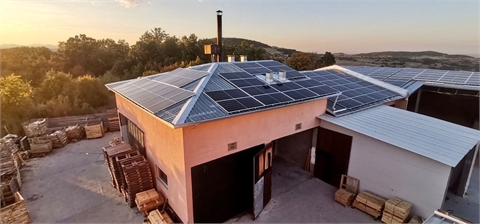
.jpg&w=480&h=480)
.jpg&w=480&h=480)
.jpg&w=480&h=480)
